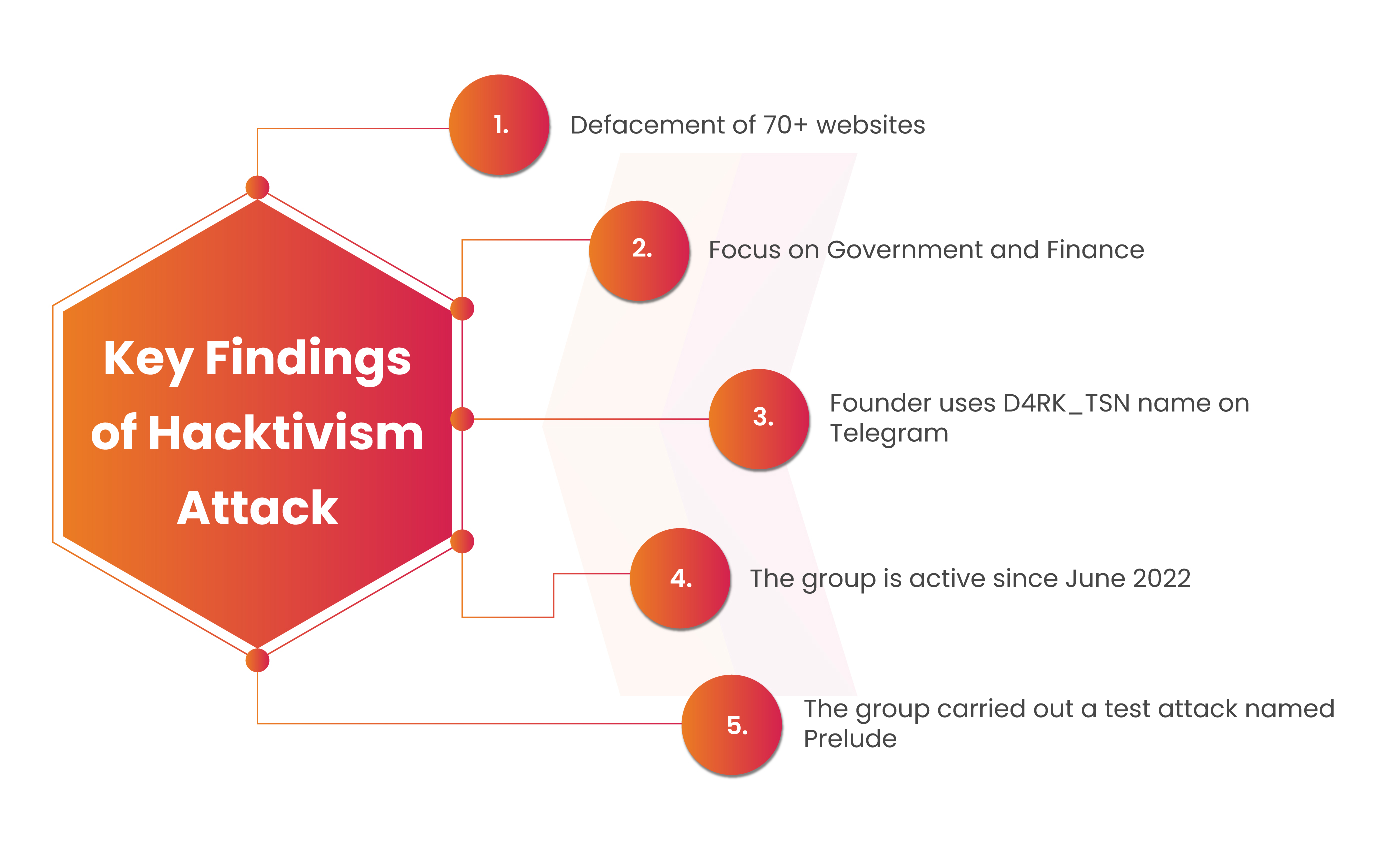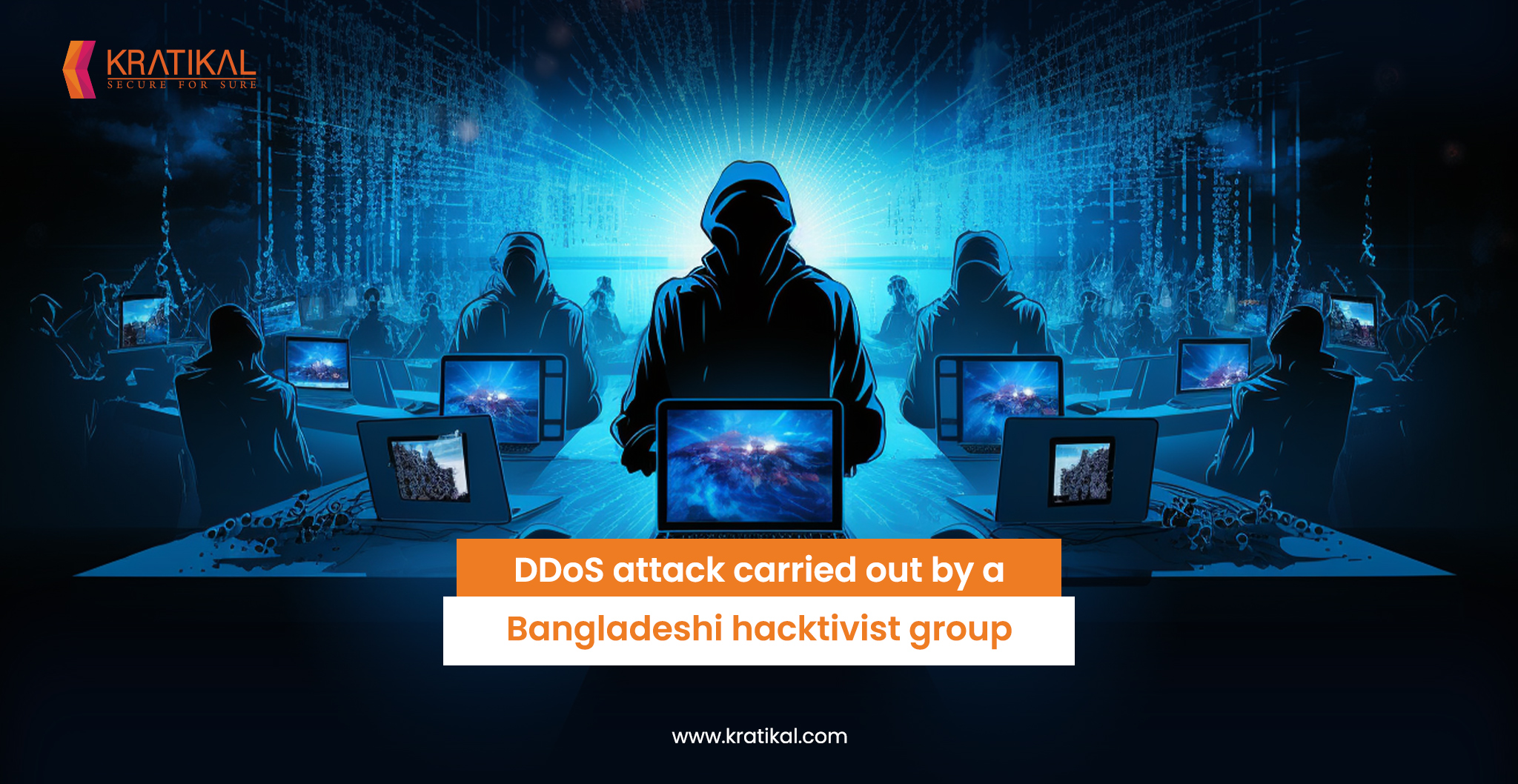‘Mysterious Team Bangladesh,’ a notorious hacktivist organization from Bangladesh, has recently increased the frequency and severity of its cyberattack, with Israel and India as their top targets. For their size and impact, this politically motivated cyberattack—which totals over 750 distributed denial-of-service (DDoS) and 70 defacement assaults—has gained recognition.
What fuels this mysterious team’s activities, and what are their future objectives? In this blog, we delve into the rise of Mysterious Team Bangladesh, their targeted sectors, global reach, and the concerning implications of hacktivism in today’s digital landscape.
Table of Contents
Motivated by Politics, Mysterious Team Bangladesh Intensifies its attacks
An active hacktivist group from Bangladesh has escalated its cyberattack against India citing political motivations, according to recent research findings.
Book Your Free Cybersecurity Consultation Today!
Extensive Campaign: Over 750 DDoS and 70 Defacement Attacks
Since June of last year, Mysterious Team Bangladesh has launched over 750 DDoS cyberattack, flooding websites with malicious traffic, and conducted 70 defacement attacks that alter site content. Notably, India has been the target of 34% of these attacks, with Israel experiencing 18%.
Origin and Notoriety: The emergence of Mysterious team Bangladesh
Group-IB traces the beginnings of the Bangladeshi hacktivist collective back to 2020 when it was founded by an attacker using the pseudonym D4RK TSN. However, it wasn’t until 2022 that the group gained international notoriety through a series of cyberattack targeting high-profile entities in India and Israel.
Targeted Sectors: Government, Finance, and Transportation in the Crosshairs
Mysterious Team Bangladesh predominantly targets government, financial, and transportation sectors, opting to focus on specific countries rather than individual companies or industries, say researchers.
Motivated by Current Events: Political Triggers
Much Like other hacktivist groups, Bangladeshi hackers draw motivation from contemporary news events, often leading them to launch attacks against specific countries. Their triggers are typically linked to politics.
Get in!
Join our weekly newsletter and stay updated
Global Reach: Notable incidents in Sweden and Australia
In February, they targeted Swedish organizations, possibly in response to Quran desecration. A parallel hacker group, Anonymous Sudan, also targeted Sweden for similar reasons. Additionally, their attack on Australian organizations might have been triggered by using the religious words ” in clothing designs featured during a Melbourne fashion show.
Attack Methods: DDoS, Defacement, and Server Exploits
Mysterious Team Bangladesh primarily employs DDoS and website defacement cyber attacks. They occasionally breached servers by exploiting vulnerabilities or using common admin passwords.
Expansion and Future Targets
Mysterious Team Bangladeshi expanded beyond India, targeting Israel, Senegal, Ethiopia, Australia, Sweden, and the Netherlands. Researchers anticipate the group’s expansion in 2023, focusing on financial and government sectors across Europe, Asia-Pacific, and the Middle East.
The Underestimated Threat of Hactivism
Hacktivism, often underestimated, poses a significant threat. The actions of these hacktivist groups can disrupt critical systems, resulting in substantial monetary losses and damage to the reputation of affected organizations, caution researchers.
According to the research group, some key findings of this attack are :
- These hacktivists have defaced over 70 websites in a year
- This group mostly targets the government and financial sectors in India
- The founder of this group uses the nickname D4RK_TSN in telegram
- The group was supposed to be created in 2020 and operating since June 2022
- The group carried out a test attack before starting full fledge attack to test their target defense mechanism

Prevention of DDoS through VAPT Testing
Here are some key points related to the prevention of DDoS attacks through Vulnerability Assessment and Penetration Testing (VAPT):
Assessment of DDoS Resilience
- VAPT goes beyond identifying vulnerabilities; it simulates real-world DDoS attack scenarios.
- Security professionals analyze how your systems respond under such simulated attacks.
- This assessment helps in gauging your organization’s resilience against DDoS threats.
Application-Level Testing
- Many DDoS attacks target web applications.
- VAPT includes testing the security of your web applications.
- This process identifies vulnerabilities in the application layer that attackers could exploit.
Recommendations for Mitigation
- VAPT provides actionable recommendations.
- These recommendations might include implementing web application firewalls (WAFs), content delivery networks (CDNs), or traffic filtering solutions.
- They help strengthen your defenses against DDoS attacks.
Regular Testing
- DDoS attackers continually evolve their tactics.
- Regular VAPT testing ensures that your defenses evolve with them.
- It’s an ongoing process to stay ahead of emerging threats.
Training and Awareness
VAPT also includes training and raising awareness among the employees in an organization to recognize and respond to potential DDoS threats promptly.
Conclusion
As the specter of hacktivism looms large, Mysterious Team Bangladesh’s intensified cyberattack serves as a stark reminder of the threats faced by nations and organizations worldwide. With a global reach that has extended to multiple countries, including India, Israel, Sweden, Australia, and others, this hacktivist group is prepared for further growth in the upcoming year. Their goals, which are frequently based on current political events, underscore the necessity for proactive cybersecurity measures to reduce the risks that these groups pose.
The world must recognize the underestimated menace of hacktivism, which has the potential to disrupt critical systems, inflict significant financial losses, and tarnish the reputation of targeted entities. In an era where cyber threats continue to evolve, vigilance and preparedness remain the keys to safeguarding our digital landscape.
Organizations can stop such threats with regular VAPT testing and adequate security compliance. Kratikal offers comprehensive cybersecurity solutions designed to safeguard businesses from a range of cyber attacks, with a particular focus on protecting online applications from potential attacks. Kratikal helps businesses find and fix security holes before hackers can take advantage of them as a CERT-In-Empanelled organization.









Leave a comment
Your email address will not be published. Required fields are marked *